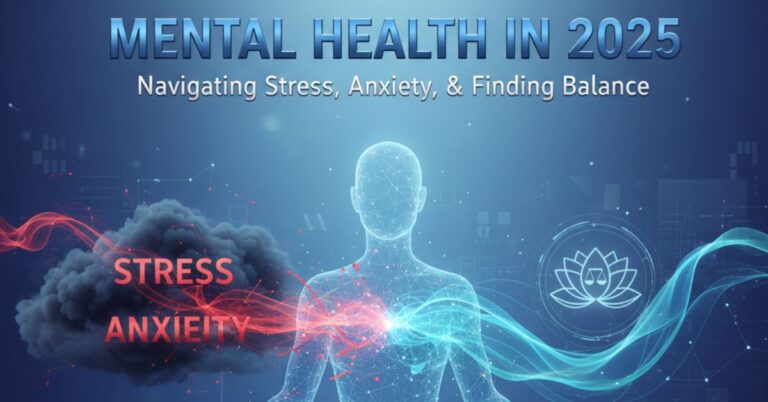
Introduction
If you’re always tired, you’re not alone. Fatigue is one of the top five reasons people visit doctors worldwide. According to the CDC (2024), around 35% of adults in the US report not getting enough sleep, while the ICMR (India, 2025) shows fatigue-related complaints have risen by 22% in metro cities due to lifestyle and stress.
The truth is, constant tiredness usually comes from everyday habits, sleep quality, diet, stress, or underlying health conditions. In this guide, you’ll discover the 10 most common causes of fatigue and practical fixes you can start today.
1. Poor Sleep Quality
Even if you’re in bed for 8 hours, poor sleep quality leaves you drained. Sleep apnea, insomnia, or irregular schedules disturb your body clock.
Fix: Maintain a regular sleep routine, reduce screen time, and try a sleep-friendly environment (dark, cool, quiet).
2. Dehydration
Even mild dehydration lowers energy levels and concentration. Many people mistake thirst for hunger, leading to fatigue.
Fix: Aim for 2–3 liters daily (adjust for climate/activity).
See our full guide on How Much Water Should You Drink a Day.
3. Poor Diet & Nutrient Deficiency
A diet high in sugar and processed food causes energy crashes. Deficiencies in iron, vitamin D, or B12 also trigger constant fatigue.
Fix: Eat balanced meals with protein, fiber, and whole foods. Consider regular blood checks for deficiencies.
4. Stress and Anxiety
Stress raises cortisol, which disrupts sleep and drains energy. Anxiety disorders are a major hidden cause of chronic fatigue.
Fix: Stress management techniques like meditation, journaling, and counseling help restore energy.
5. Lack of Physical Activity
It sounds odd, but inactivity makes you more tired. Regular movement boosts circulation and oxygen levels, fighting fatigue.
Fix: Start with a 20-minute daily walk or light exercise.
6. Illness or Infections
Respiratory illnesses like flu, COVID-19, or even bronchitis can cause fatigue as your body fights infection.
Read our guide on Is Bronchitis Contagious?.
7. Anemia
Iron-deficiency anemia is one of the most common medical causes of tiredness, especially in women. Without enough hemoglobin, oxygen transport drops, making you weak.
Fix: Iron-rich foods (spinach, lentils, red meat) or supplements (doctor prescribed).
8. Thyroid Disorders
An underactive thyroid slows metabolism, making you sluggish. In India, hypothyroidism affects nearly 1 in 10 adults (ICMR, 2024).
Fix: Blood test for TSH levels; treatment includes thyroid medication.
9. Diabetes or Blood Sugar Imbalance
Fluctuating blood sugar levels cause extreme tiredness, especially after meals. Undiagnosed diabetes is a silent cause for many.
Fix: Manage carbs, exercise, and consult a doctor for screening.
10. Medications & Lifestyle Factors
Certain medications (antihistamines, antidepressants) cause drowsiness. Excess caffeine, alcohol, and irregular schedules worsen fatigue.
Fix: Adjust habits, and if medication is the issue, consult your doctor.
Practical Fixes for Everyday Energy
- Stick to a consistent sleep routine
- Drink enough water
- Eat iron- and vitamin-rich foods
- Exercise at least 4 days a week
- Reduce caffeine and alcohol
- Manage stress with relaxation practices
Why am I tired even after 8 hours of sleep?
Poor sleep quality (apnea, insomnia, stress) can make you tired even after 8 hours.
What vitamin deficiency causes tiredness?
Iron, vitamin B12, and vitamin D deficiencies are common causes.
Why do I feel tired all the time as a teenager?
Irregular sleep, screen use, poor diet, and stress are leading factors in teens.
Is constant fatigue a sign of illness?
Sometimes yes. It may point to thyroid issues, diabetes, anemia, or infections.
How do I know if my fatigue is serious?
If it lasts longer than 3 weeks or comes with weight loss, fever, or breathlessness, consult a doctor.
Disclaimer
This article is for educational purposes only. It does not replace professional medical advice, diagnosis, or treatment. Always seek the guidance of a qualified healthcare provider with any questions you may have about a medical condition. Never disregard professional medical advice or delay seeking it because of something you have read here.




